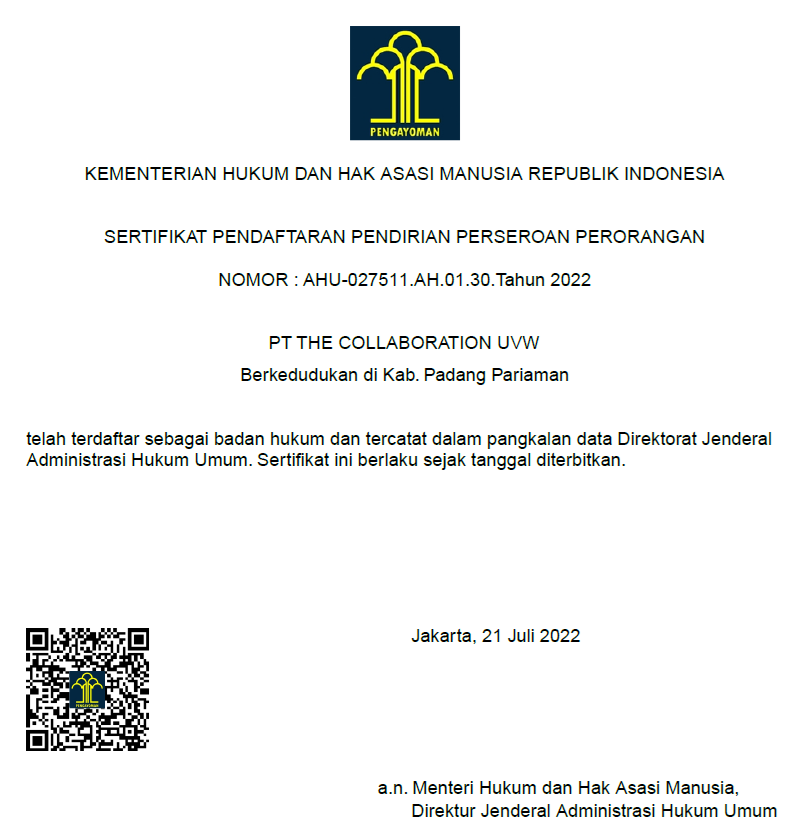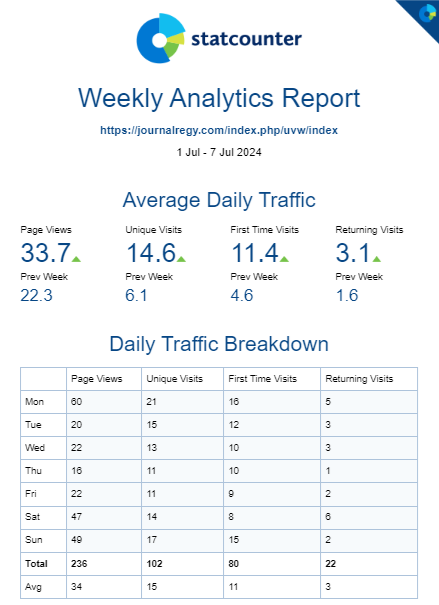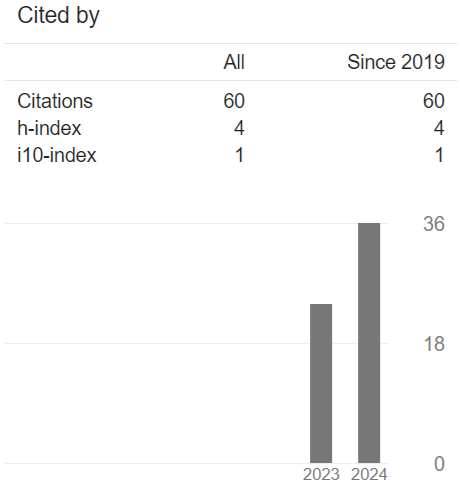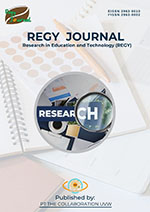Development of video song-based learning media on English speaking skills phase E students at SMAN 1 Pulau Punjung
DOI:
https://doi.org/10.62590/regy.v2i2.103Keywords:
videos, songs, instructional media, speaking skillsAbstract
This research aimed to see the extent to which students are interested in learning using song videos. The development of song-video-based learning can provide more understanding, insight, and knowledge to students, especially students at SMAN 1 Pulau Punjung so that students can improve their abilities. Skills their English more actively. This research method was carried out using a non-quantitative method associative. The research sample numbered 73 people from 268 phase E students at SMAN 1 Pulau Punjung. Based on the needs analysis questionnaire distributed, it can be concluded that the development of song-video-based learning media was indeed very important and needed following the interest indicator of 94% in the very high category and the need indicator of 92% in the also very high category.
References
Adolphe, B. (2021). The Mind’s Ear: Exercises for Improving the Musical Imagination for Performers, Composers, and Listeners. Oxford: Oxford University Press.
Akbary, M., Shahriari, H., & Hosseini Fatemi, A. (2016). The Value of Song Lyrics for Teaching and Learning English Phrasal Verbs: A Corpus Investigation of Four Music Genres. Innovation in Language Learning and Teaching, 12(4), 344-356. https://doi.org/10.1080/17501229.2016.1216121.
Alaon, C. L., Delos-Santos, J., & San-Jose, A. (2023). Improving Speaking Communication Skills in English through Self-Directed Strategy. International Journal of Educational Innovation and Research, 2(1), 1-9. https://doi.org/10.31949/ijeir.v2i1.2920.
Ananda, I., & Rakhmawati, A. (2022). Pembelajaran Sastra Populer sebagai Peningkatan Literasi Digital dengan Penggunaan Media Aplikasi Wattpad: Studi Kasus. Research in Education and Technology (REGY), 1(1), 36-45. https://doi.org/10.62590/regy.v1i1.6.
Ardianto, D. T., Riyanto, B., & Fajriani, B. (2021). Circle of Worry Song Video Clip as a Campaign Medium to Save the Environment from Damage. IOP Conference Series: Earth and Environmental Science.
Arthur, C. (2023). Why do Songs Get “Stuck in Our Heads”? Towards a Theory for Explaining Earworms. Music & Science, 6(2023), 1-15. https://doi.org/10.1177/20592043231164581.
Ban, B., Pang, S., & Em, S. (2023). Debate: One of the Key Factors to Improving Students’ English Language Speaking Skills. Journal of General Education and Humanities, 2(2), 107-120. https://doi.org/10.58421/gehu.v2i2.69.
Batubara, Q. N. M. (2023). ICT-Based Needs Analysis of Learning Arts and Culture in Middle School at Sunggal. Research in Education and Technology (REGY), 2(1), 43-47. https://doi.org/10.62590/regy.v2i1.96.
Bohari, L. (2020). Improving Speaking Skills through Small Group Discussion at Eleventh Grade Students of SMA Plus Munirul Arifin NW Praya. Journal of Languages and Language Teaching, 7(1), 68-81. https://doi.org/10.33394/jollt.v7i1.1441.
Bolton, K., & Graddol, D. (2012). English in China Today: The Current Popularity of English in China is Unprecedented, and Has Been Fuelled by the Recent Political and Social Development of Chinese Society. English Today, 28(3), 3-9. https://doi.org/10.1017/S0266078412000223.
Brewster, J., Ellis, G., & Girard, D. (1992). The Primary English Teacher’s Guide. London: Penguin English Guide.
Choi, L. J. (2021). English as an Important but Unfair Resource: University Students’ Perception of English and English Language Education in South Korea. Teaching in Higher Education, 29(1), 144-158. https://doi.org/10.1080/13562517.2021.1965572.
Daryanto. (2012). Media Pembelajaran. Bandung: PT Sarana Tutorial Nurani Sejahtera.
Derakhshan, A., Khalili, A., & Beheshti, F. (2016). Developing EFL Learner’s Speaking Ability, Accuracy and Fluency. English Language and Literature Studies, 6(2), 177-186. http://dx.doi.org/10.5539/ells.v6n2p177.
Dewi, M. (2018). Need Analysis Pengembangan Model Pembelajaran Berbasis Proyek E Commerce pada Mata Kuliah Kewirausahaan. Jurnal Pendidikan dan Teknologi Informasi, 5(1), 71-80.
DeWilde, V., Brysbaert, M., & Eyckmans, J. (2020). Learning English through Out-of-School Exposure. Which Levels of Language Proficiency are Attained and Which Types of Input are Important? Bilingualism: Language and Cognition, 23(1), 171-185. https://doi.org/10.1017/S1366728918001062.
Dong, C., Cao, S., & Li, H. (2020). Young Children’s Online Learning during COVID-19 Pandemic: Chinese Parents’ and Attitudes. Children and Youth Services Review, 118(2020), 1-9. https://doi.org/10.1016/j.childyouth.2020.105440.
Engh, D. (2013). Why Use Music in English Language Learning? A Survey of the Literature. English Language Teaching, 6(2), 113-127.
Fajri, Y. A., & Sahlan, M. (2023). Evaluasi Pembelajaran Berbasis Information and Communication Technology (ICT) pada Mata Pelajaran PAI. Research in Education and Technology (REGY), 1(2), 99-102. https://doi.org/10.62590/regy.v1i2.77.
Fathoni, A., Sudira, P., Dharmayanti, W., & Arpan, M. (2017). Pengaruh Wawasan Kevokasionalan, Lingkungan Belajar, Sosial Ekonomi, dan Potensi Siswa SMP terhadap Minat Melanjutkan ke SMK. Edukasi: Jurnal Pendidikan, 15(2), 196-214. https://doi.org/10.31571/edukasi.v15i2.630.
Feladi, V., Arpan, M., & Verawardina, U. (2017). Pelatihan Pembuatan Media Pembelajaran Berbasis Animasi di SMP Negeri 2 Siantan Kabupaten Mempawah. Gervasi: Jurnal Pengabdian kepada Masyarakat, 1(1), 32-42. https://doi.org/10.31571/gervasi.v1i1.597.
Green, K., & Fujita, J. (2016). Students of Different Subjects Have Different Levels of Extrinsic and Intrinsic Motivation to Learn English: Two Different Groups of EFL Students in Japan. English Language Teaching, 9(9), 156-165. http://dx.doi.org/10.5539/elt.v9n9p156.
Halawa, E. (2021). Derivation and Inflection on Selena Gomez Song Lyrics in Revival Album. Research on English Language Education, 3(2), 33-41. https://doi.org/10.57094/relation.v3i2.392.
Hassan, H., Hariri, N. A., & Khan, K. (2020). Enhancing Intrinsic Motivation to Learn in Adults: Empowering ESL Students. International Journal of English Linguistics, 10(1), 81-90. https://doi.org/10.5539/ijel.v10n1p81.
Hendrawaty, N. (2019). The Influence of Listening English Pop Songs to Improve Learners' Vocabulary at LKP Nuansa Jaya. Loquen: English Studies Journal, 12(1), 56-65. https://doi.org/10.32678/loquen.v12i01.1192.
Herlisya, D., & Wiratno, P. (2022). Having Good Speaking English through TikTok Application. Journal Corner of Education, Linguistics, and Literature, 1(3), 191-198. https://doi.org/10.54012/jcell.v1i3.35.
Hermanto, Y. B., Agustini, V., & Srimulyani. (2021). The Challenges of Online Learning During the Covid-19 Pandemic. Jurnal Pendidikan dan Pengajaran, 54(1), 46-57. https://doi.org/10.23887/jpp.v54i1.29703.
Hernando, F., Basri, I. Y., Alwi, E., & Purwanto, W. (2022). Pembuatan Video Pembelajaran Praktikum pada Mata Pelajaran Listrik Elektronika. Research in Education and Technology (REGY), 1(1), 68-75. https://doi.org/10.62590/regy.v1i1.73.
Ilyosovna, N. A. (2020). The Importance of English Language. International Journal on Orange Technologies, 2(1), 22-24.
Irawan, R., & Surjono, H. D. (2018). Pengembangan E-Learning Berbasis Moodle dalam Peningkatkan Pemahaman Lagu pada Pembelajaran Bahasa Inggris. Jurnal Inovasi Teknologi Pendidikan, 5(1), 1-11. https://doi.org/10.21831/jitp.v5i1.10599.
Kasdi, K., & Wijayanti, D. N. (2017). Pembelajaran Bahasa Inggris Efektif Melalui Lagu Anak-Anak untuk Siswa Madrasah Ibtidaiyah. ELEMENTARY: Islamic Teacher Journal, 4(1), 124-148. https://doi.org/10.21043/elementary.v4i1.1931.
Khan, A. K., Samad, A., & Khan, I. U. (2021). Intrinsic Motivation and Extrinsic Motivation as the Factors Involved in English Learning in District Bannu. Pakistan Social Sciences Review, 5(2), 385-402.
Kusnasari, Z. Z., & Rakhmawati, A. (2022). Inovasi Pembelajaran Bahasa Baku dengan Media Pembelajaran Game Edukasi Who Wants to be a Millionaire. Research in Education and Technology (REGY), 1(1), 46-50. https://doi.org/10.62590/regy.v1i1.7.
Lai, H-Y. T. (2013). The Motivation of Learners of English as a Foreign Language Revisited. International Education Studies, 6(10), 90-101. http://dx.doi.org/10.5539/ies.v6n10p90.
Lesmana, C., Arpan, M., Ambiyar, A., Wakhinuddin, W., & Fatmawati, E. (2019). Respons Mahasiswa terhadap Pelaksanaan Program Matrikulasi. Edukasi: Jurnal Pendidikan, 17(2), 227-237. http://dx.doi.org/10.31571/edukasi.v17i2.1528.
Lesmana, C., & Arpan, M. (2017). Penerapan Model Pembelajaran Project Based Learning terhadap Kemampuan Psikomotor, Aktivitas Belajar, dan Respon Mahasiswa. Jurnal Pendidikan Informatika dan Sains, 6(1), 8-19. http://dx.doi.org/10.31571/saintek.v6i1.483.
Lingga, L., Simanjuntak, R., & Sembiring, Y. (2020). Students’ Strategies in Learning Speaking Skills at SMP Nasrani 3 Medan. Journal of Languages and Language Teaching, 8(1), 91-99. https://doi.org/10.33394/jollt.v8i1.2238.
Mangelen, B. J., Bawa, L. S., Untong, L. P., & Mohamad, H. A. (2023). Maguindanaon Love Songs as Tool and Springboard in Teaching Figurative Language for Maguindanaon Culture Preservation. Journal of Natural Language and Linguistics, 1(1), 1-20.
Meinawati, E., Harmoko, D., Rahmah, N., & Dewi, N. (2020). Increasing English Speaking Skills Using Youtube. Polyglot: Jurnal Ilmiah, 16(1), 1-13. http://dx.doi.org/10.19166/pji.v16i1.1954.
Mulyani, F., & Haliza, N. (2021). Analisis Perkembangan Ilmu Pengetahuan dan Teknologi (Iptek) dalam Pendidikan. Jurnal Pendidikan dan Konseling (JPDK), 3(1), 101-109. https://doi.org/10.31004/jpdk.v3i1.1432.
Muna, N., Khasanah, M., & Anbiya, B. F. (2023). Analisis Pemanfaatan E-Learning Walisongo dalam Mata Kuliah Pendidikan Kewarganegaraan. Research in Education and Technology (REGY), 1(2), 85-91. https://doi.org/10.62590/regy.v1i2.85.
Murphey, T. (1992). Music and Song. Oxford: Oxford University Press.
Natalie, S. (2016). Music and the Child. New York City: Open SUNY Textbooks.
Novianto, H., & Nadawina, N. (2022). Kajian Literatur: Pembelajaran Berbasis Teknologi di Abad 21 pada Mata Kuliah Gambar Perencanaan Jurusan Teknik Sipil. Research in Education and Technology (REGY), 1(1), 22-26. https://doi.org/10.62590/regy.v1i1.4.
Phisutthangkoon, K. (2016). Effectiveness of English Song Activities on Vocabulary Learning and Retention. The European Conference on Language Learning 2016 Official Conference Proceedings.
Pinter, A. (2017). Teaching Young Language Learners, Second Edition. Oxford: Oxford University Press.
Putri, M., Rahmiati, R., Dewi, M., Irfan, D. (2022). Praktikalitas Penggunaan E-Modul dalam Pembelajaran Nail Art. JRTI (Jurnal Riset Tindakan Indonesia), 7(1), 60-62. https://doi.org/10.29210/30031508000.
Purwanti, R., & Suhaimi, S. (2020). Model GELPITAS (Gerak & Lagu, Picture & Picture, Talking Stick) untuk Meningkatkan Perkembangan Bahasa Inggris Anak Taman Kanak-Kanak. JPPM (Jurnal Pendidikan dan Pemberdayaan Masyarakat), 7(2), 124-134.
Rachmawati, E., Apollonia , R., & Meila, I. R. (2020). Male and Female Students’ Perception on the Use of Popular Song to Improve Students’ Vocabulary Mastery. Jadila: Journal of Development and Innovation in Language and Literature Education, 1(2), 239-253. https://doi.org/10.52690/jadila.v1i2.105.
Rahman, A. S., Amin, B., & Saiful. (2018). The Use of Media Music Video to Improve Students’ Competence in Writing Skill: An Experimental Research. Journal of Computer Interaction in Education, 1(1), 7-17.
Rao, P. S. (2019). The Role of English as a Global Language. Research Journal of English, 4(1), 65-79.
Ratminingsih, N. M., & Budasi, I. G. (2014). Pengembangan Media Audio Pembelajaran Bahasa Inggris Berbasis Lagu Kreasi di Kelas Lima Sekolah Dasar. Laporan Penelitian. Universitas Pendidikan Ganesha Singaraja.
Rusmiyanto, R., Huriati, N., Fitriani, N., Tyas, N., Rofi’i, A., & Sari, M. (2023). The Role of Artificial Intelligence (AI) in Developing English Language Learner’s Communication Skills. Journal on Education, 6(1), 750-757. https://doi.org/10.31004/joe.v6i1.2990.
Shabani, S., & Alipoor, I. (2017). The Relationship between Cultural Identity, Intrinsic Motivation and Pronunciation Knowledge of Iranian EFL Learners. International Journal of Education and Literacy Studies, 5(2), 61-66. https://doi.org/10.7575/AIAC.IJELS.V.5N.2P.61.
Shobikah, N. (2020). Competences in English. Journal of Research on English and Language Learning (J-REaLL), 1(1), 23-36. https://doi.org/10.33474/j-reall.v1i1.5280.
Shofi, A. T. (2020). Employing Multimedia-Based Learning to Improve English Speaking Skills. Journal of English Language Teaching and English Linguistics, 5(1), 1-9. https://doi.org/10.31316/eltics.v5i1.525.
Sholihah, K., Anbiya, B. F., & Qonita, D. U. (2023). Online Learning: Tantangan dan Peluang Pasca Pandemi Covid-19. Research in Education and Technology (REGY), 1(2), 111-117. https://doi.org/10.62590/regy.v1i2.84.
Sii, P., Verawardina, U., Arpan, M., & Sulistiyarini, D. (2017). Penerapan Model Pembelajaran Inkuiri pada Mata Pelajaran KKPI terhadap Kemampuan Psikomotorik Siswa. Jurnal Pendidikan Informatika dan Sains, 6(2), 166-176. http://dx.doi.org/10.31571/saintek.v6i2.642.
Smith, L. (2015). English as an International Language: No Room for Linguistic Chauvinism. Journal of English as a Lingua Franca, 4(1), 165-171. https://doi.org/10.1515/jelf-2015-0002.
Sofa, N. A., Annaafi’atsaani, I., Ihsanuddin, A. N., & Anbiya, B. F. (2023). Analisis Pemanfaatan Platform TikTok sebagai Media Aktualisasi Diri Peserta Didik. Research in Education and Technology (REGY), 1(2), 92-98. https://doi.org/10.62590/regy.v1i2.83.
Storr, A. (2015). Music and the Mind. New York City: Simon and Schuster.
Sulistiyarini, D., Bibi, S., Fatmawati, E., & Arpan, M. (2018). Pelatihan Pembuatan Media Pembelajaran Interaktif di SMP dan SMK Mandiri Pontianak. Gervasi: Jurnal Pengabdian kepada Masyarakat, 2(1), 39-46. https://doi.org/10.31571/gervasi.v2i1.811.
Sun, Z., Lin, C. H., You, J., Shen, H. jiao, Qi, S., & Luo, L. (2017). Improving the English-Speaking Skills of Young Learners through Mobile Social Networking. Computer Assisted Language Learning, 30(3-4), 304-324. https://doi.org/10.1080/09588221.2017.1308384.
Suoth, A. A., Wuntu, C. N., & Rorintulus, O. A. (2023). The Effectiveness of Using Novels in Learning Process to Improve the English Language Skills: A Systematic Review. Journal of English Language Teaching, Literature and Culture, 2(1), 84-95. https://doi.org/10.53682/jeltec.v2i1.6250.
Supardi, S., Putra, R. K., Iqbal, M., & Toni, K. (2023). Development of Mobile AR Applications as a Science Learning Media in Increasing Junior High School Students’ Interest in Learning. Research in Education and Technology (REGY), 2(1), 1-5. https://doi.org/10.62590/regy.v2i1.93.
Suryasa, W., Prayoga, I. G. P. A., & Werdistira, I. W. A. (2017). An Analysis of Students Motivation toward English Learning as Second Language among Students in Pritchard English Academy (PEACE). International Journal of Social Sciences and Humanities, 1(2), 43-50. https://doi.org/10.29332/ijssh.v1n2.36.
Syaifullah, L., Ambiyar, A., Zaus, M. A., & Arpan, M. (2024). Efektivitas Pendekatan Blended Learning Berbantuan E-Learning terhadap Hasil Belajar Mahasiswa. Juwara Jurnal Wawasan dan Aksara, 4(1), 1-12. https://doi.org/10.58740/juwara.v4i1.73.
Tan, S-L., Pfordresher, P., & Harré, R. (2017). Psychology of Music from Sound to Significance. London: Routledge.
Tsai, S.-C. (2023). Learning with Mobile Augmented Reality and Automatic Speech Recognition-Based Materials for English Listening and Speaking Skills: Effectiveness and Perceptions of Non-English Major English as a Foreign Language Students. Journal of Educational Computing Research, 61(2), 444-465. https://doi.org/10.1177/07356331221111203.
Uzer, Y. (2019). Implementasi Pembelajaran Bahasa Inggris Anak. Pernik Jurnal PAUD, 2(1), 1-7.
Wahyuni, S., Ritonga, M., & Afrianti, W. (2023). Systematic Review of Learning Method for Teaching Arabic Listening and Speaking Skills. Al-Hayat: Journal of Islamic Education, 7(1), 30-41. https://doi.org/10.35723/ajie.v7i1.321.
Werner, R. (2018). Music, Movement and Memory: Pedagogical Songs as Mnemonic Aids. Tesol Journal, 9(4), 1-11. https://doi.org/10.1002/tesj.387.
Downloads
Published
How to Cite
Issue
Section
License
Copyright (c) 2024 Neni Sri Wahyuni, Dodi Widia Nanda, Raimon Efendi

This work is licensed under a Creative Commons Attribution-ShareAlike 4.0 International License.

















